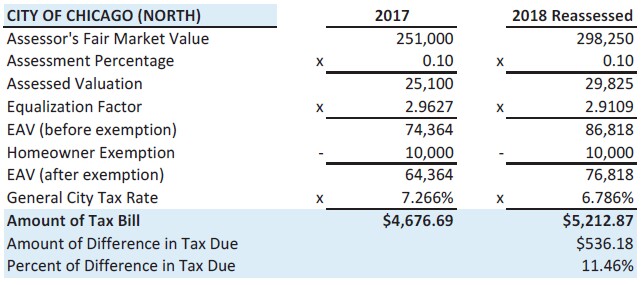The 2018 property tax bills are out (you can look them up here although they will be mailed really soon) and with them the 2018 Cook County Property Tax Rate report, which provides way too much information on everything you might possibly want to know about how the tax bills for last year were calculated. As I’ve done each of the last few years, I’m boiling down the whole convoluted mess into a single number (well, technically two numbers) because that’s what you need to know in order to estimate your future Chicago property taxes – e.g. if you are buying a place that is woefully under or over assessed.
I’ll start with the 30,000 foot view. The City of Chicago needed an extra $460 MM this year so right there you have a 7.4% increase in the take from 2017. Then you have the impact of the Cook County Assessor finally getting their act together and producing more accurate assessed property values. Historically, they over assessed lower priced properties and under assessed higher end properties but they really fixed a lot of this bias for 2018. I’ve been seeing more accurate valuations for the last year.
They divide the city up into 3 areas: North, Central, and South. The table below breaks down the changes in average assessed values and tax bills for the 3 areas and the suburbs. As I predicted last year tax bills did not go up by as much as the assessed values did. When the tax base inflates (by 12.5% in 2018) it is offset by a reduction in the tax rate. Nevertheless, the North and Central parts of the city saw their tax bills go up by more than 11% while the South side went up by just under 1%. Although people in the central and north sides of the city are not happy about this they have to admit this is more accurate and fair. The numbers are what they are.

The key illustration for me is where they demonstrate how those average property taxes above are calculated in the table below. I like to express this calculation in a much simpler form – i.e. a single factor, applied to the assessor’s estimate of the fair market value, with a dollar deduction for the homeowner exemption. So the factor for 2018 comes out to 1.97% – essentially 2% – compared to 2.15% for 2017. And the homeowner’s exemption is worth around $679 this year (6.786% of $10,000).
As I said early on in this post and what I always tell our home buyers is that you should ignore the current property taxes. Instead, you want to keep those 2% and $679 numbers handy if you are buying a property. For example. If you are about to buy a $500K condo that the assessor thinks is worth only $400k then the county is going to eventually realize that they made a mistake and your assessed value will go up to what you paid for it. Likewise, if they think it’s worth $600K then the first chance you get you need to appeal your valuation with a copy of your closing statement. You should, at least in theory, be able to get your valuation reduced. So, in the long run your own property tax estimates will be a better indicator of what your taxes will be than what the MLS shows today.
#PropertyTaxes #ChicagoTaxes
Gary Lucido is the President of Lucid Realty, the Chicago area’s full service real estate brokerage that offers home buyer rebates and discount commissions. If you want to keep up to date on the Chicago real estate market or get an insider’s view of the seamy underbelly of the real estate industry you can Subscribe to Getting Real by Email using the form below. Please be sure to verify your email address when you receive the verification notice.
